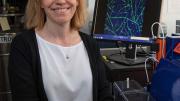As a 10-year-old, Amy Wagers knew she wanted to be a scientist, but it wasn’t until she registered as a bone-marrow donor during her senior year at Northwestern University that she decided to focus on stem cells. After receiving her Ph.D. in immunology and microbial pathogenesis from Northwestern, and completing a postdoctoral fellowship at Stanford with Irving Weismann, one of the earliest pioneers of stem-cell research, she became an associate professor of pathology and investigator at the Harvard-affiliated Joslin Diabetes Center. “I got into aging through the lens of stem-cell regulation,” she says. “There’s a linkage between the pathophysiology of aging and the pathophysiology of diabetes, particularly type 2 diabetes.” In 2008, Wagers moved to the new department of stem cell and regenerative biology, which she now co-chairs. “When I was a postdoc and I was applying for jobs in academia, my dad said, ‘When are you going to get out of school?’ and I said, ‘Well, hopefully never!’” If she isn’t working with students in her lab, the Forst Family professor of stem cell and regenerative biology is often found spending time with her six-year-old son, teaching or meeting with undergraduates enrolled in her course on aging—or sky-diving above Newport, Rhode Island. That practice unexpectedly became tradition when Wagers promised a colleague that if the very first paper out of her lab was published by the prestigious journal Nature, she would go skydiving to celebrate. “I was so exhilarated! Afterwards, I went to a little clam shack and had a beer and some fried clam strips and I was like, ‘I’m alive!’” Now Wagers invites graduate students whose work is accepted by high-impact publications to join her on a skydiving trip. So far, just one has accepted.
Harvard Portrait: Amy Wagers
Harvard Portrait: Amy Wagers
The skydiving Forst Family professor studies the pathophysiology of aging.

Amy Wagers
Photograph by Jon Chase/Harvard Public Affairs and Communications
You might also like
Five Questions with Nancy Gibbs and Thomas E. Patterson
The Washington Post laid off more than a third of its journalists. Does this signal a new era for newsrooms?
Harvard’s Epstein Probe Widened
The University investigates ties to donors, following revelations in newly released files.
Harvard Magazine Questionnaire: The True Cost of Grade Inflation
A faculty committee is recommending changes to grading at Harvard College to limit an overabundance of A's. Add your voice to the conversation.
Most popular
Explore More From Current Issue

What Bonobos Teach Us about Female Power and Cooperation
A Harvard scientist expands our understanding of our closest living relatives.

The Enterprise Research Campus in Allston Nears Completion
A hotel, restaurants, and other retail establishments are open or on the way.





